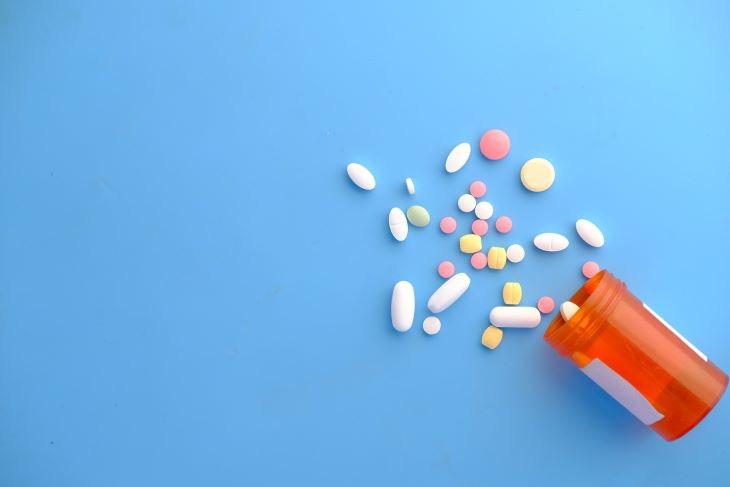How Long Does Adderall Stay in Your System?
Adderall is the brand name for a combination of amphetamine and dextroamphetamine.
It is a legal medication prescribed to those with Attention Deficit Hyperactivity Disorder (ADHD) or Narcolepsy.
ADHD is a disorder characterised by inattention, hyperactivity and impulsivity, first recognised by doctors in the late 1980s.
Diagnoses for ADHD have risen exponentially since that time, with records showing that by 2013, over 13 million children were on stimulants to regulate symptoms of ADHD.
If you think you may be suffering from an addiction to Adderall, give our expert team a call today on 0800 088 66 86
The Origins of Adderall

Adderall was created by accident in the late 1920s by an American chemist named Gordon Alles, who was trying to find an asthma treatment. Instead, Alles had created amphetamine.
By the 1930s, Benzedrine, a brand name for a type of amphetamine, was taken to increase mood and boost energy. The American army would disperse these pills to their soldiers during WW2, nicknaming them ‘go pills’.
The pill was later rebranded for housewives of the 1950s as the diet drug Obetrol.
The love for amphetamines came for their appetite-suppressing side effects, with over 10 million adults using them by the 1970s. By then, authorities had begun to truly understand the addictive and dangerous nature of amphetamines and tight restrictions were implemented.
In the 1990s, the diet pill Obetrol was tweaked and rebranded as Adderall, aimed at children and young adults with ADHD.
Still concerned with the addictive qualities of amphetamine, a time-release version of Adderall (Adderall XR) came out a short time later, marketed as non-addictive. In theory, this would have been a success.
How does Adderall work?

Branded amphetamines include Adderall, Adderall XR and Mydayis, Concerta, Ritalin and Dexedrine, all medications used to treat ADHD.
Adderall is one of the most widely prescribed ADHD medications, with millions of children given stimulants worldwide.
Adderall increases dopamine, serotonin, and norepinephrine levels, stimulating the brain and central nervous system
In those with ADHD, this brings them to regular functional stimulation. In others, it will overstimulate, causing euphoria and heightened energy.
In 2017, over 12 million children were prescribed Adderall and similar ADHD medication. Sources have stated that prescript stimulants have improved symptoms of ADHD in children by 70%.
To find out more about how Adderall works, call our team today on 0800 088 66 86
Adderall Abuse

Street stimulants like methamphetamines, cocaine and ecstasy have been popular among teenagers; however, Adderall abuse has become rampant among universities as students seek a competitive edge.
Adderall stimulates the nervous system, creating a sense of calm in those with ADHD.
However, those who don’t have ADHD experience the opposite – they will be flushed with excessive amounts of dopamine, causing feelings of euphoria and increased energy levels.
Exasperated students may use this ‘study drug‘ to achieve better grades and improve productivity. However, upon graduating, they may need to continue taking Adderall to continue their career productivity.
Very soon, many become addicted to Adderall, as the pressure to succeed maintains into their adult lives. However, due to the narcotic being a prescribed substance, people underestimate its high severity for addiction.
Just because a doctor prescribes it doesn’t mean it isn’t addictive.
What does Adderall Addiction feel like?

Addiction is different for everyone, but a personal account can make it much easier to understand and much easier to spot in yourself or a loved one.
This is a description of what Adderall addiction from a former addiction sufferer:
You learn to love the rush and quickened pulse; your heart doesn’t beat — your body throbs. You get cold easily due to all the sweating, but you’re too overheated to put on some clothes.
You take breaks. You tell yourself they’re voluntary but in actuality, you’ve run out of pills again. “Eh. At least they lasted a full week this time.” Then you double up on booze while you impatiently wait three weeks for more. Three weeks to shed some tolerance…
Pop five pills after a sober streak — closest feeling to that first original taste all those years ago. The whole world now fascinates me.
You teach yourself a few new songs on guitar. You buy a drum kit. Maybe you’ll start your own one-man band. Maybe you’ll write a children’s book and dedicate it to your daughters. Maybe you’ll go be a Psychiatric Nurse Practitioner.
Dust the tops of your ceiling fan blades over a freshly vacuumed carpet. Vacuum again. Empty the contents of the vacuum into a full trash over a freshly vacuumed carpet. Vacuum again.
Wipe down the vacuum. Put the rag in the wash along with the bathroom mats and cat bed. Take the batteries out of the smoke detector after burning the toast. Throw the toast in the very full trash and tie the bag tight.
Grab the rag out of the washer and wipe down the trash. Put the rag back in the wash and remember to press “start.” Put another piece of bread in the toaster.
Pluck your left eyebrow until it matches your right. Then pluck your right eyebrow. You burnt the toast again but it’s well-past lunchtime anyway. And you’re really not all that hungry.
You’d clean the fridge, but you’re afraid it might try to eat you again. Anyway it’s 3am now. You should probably at least try to sleep.
Two days later you get a text at a redlight and your heart skips a beat. Your four favourite words: “Your prescription is ready.”
You do a U-turn and turn up the radio.
“Maybe start with six this time.”
Don’t let addiction control your life – give our expert team a call today on 0800 088 66 86
Adderall Side Effects

Adderall abuse can begin as a recreational habit to increase productivity and maintain focus.
However, after a raging and fast high, they crash back to reality, usually causing a heightened sense of depression.
The cycle continues as users rely on the drug to feel energised and productive. Stimulant tolerance can build fast, so you must take more to achieve the desired effect.
Adderall, mainly when not prescribed by a medical professional, can have severe side effects both physically and psychologically:
- Anxiety
- Panic attacks
- A sense of grandiosity and invincibility
- Talkativeness and fast thoughts
- Dry mouth
- Nausea
- Vomiting
The effects of Adderall can last four to six hours, meaning those who have become dependent on it may increasingly take larger doses to combat their tolerance.
They can begin crushing and snorting the drug to achieve a more potent high.
This can lead to them moving to street versions of the drug or fake Adderall tablets that contain methamphetamine.
Methamphetamine abuse can cause abnormal cardiac rhythms, increased blood pressure, rapid heart rate, an inability to feel pleasure unless taking the drug, intense cravings and death.
In 2020, approximately 23,837 people died from an overdose of methamphetamine.
How long does Adderall stay in the body?

The length of time Adderall stays in your system depends on whether you have taken an immediate-release or extended-release Adderall pill.
After taking the drug, you will begin to feel its effects between 30-60 minutes later.
Effects begin to peak around three hours for the immediate release and around seven hours for extended-release.
The drug’s time in the body is usually calculated by its half-life; Adderall’s half-life is around 10-12 hours
That means two or three days are needed before Adderall is eliminated from the body, but you may feel withdrawal symptoms for much longer.
If you would like to learn more about Adderall and how it can impact your body, call us today on 0800 088 66 86
Adderall Withdrawal Symptoms

Withdrawal symptoms from Adderall may occur in those who have chronically abused the drug and developed a significant dependence.
Adderall dependency, like many stimulants, is a psychologically addictive substance.
To conquer sobriety and maintain a healthy lifestyle, you must re-establish healthy coping mechanisms and change your thoughts and behaviours.
The first step to being clean would be to stop taking Adderall. This can create withdrawal symptoms which may include:
- Intense cravings
- Fatigue
- Depression
- Slowed heart rate
- Vivid dreams
- Lack of pleasure
- Increased appetite
- Disrupted sleep patterns
- Agitation
You will begin to feel withdrawal symptoms within a few hours to several days after stopping Adderall.
You may feel withdrawal symptoms for up to three weeks.
Many have undergone a medically assisted detox to help make their withdrawals more comfortable and help the transition between active addiction and sobriety smoother.
A supervised medical detox could include close patient monitoring and medications to decrease the likelihood of relapse. Studies have shown that the average amphetamine relapse occurs within four weeks of quitting.
Nevertheless, thousands worldwide have managed to gain control over their addictions and live healthy lives in recovery.
By reaching out for help on 0800 088 66 86, you or your loved one can achieve and maintain sobriety.




